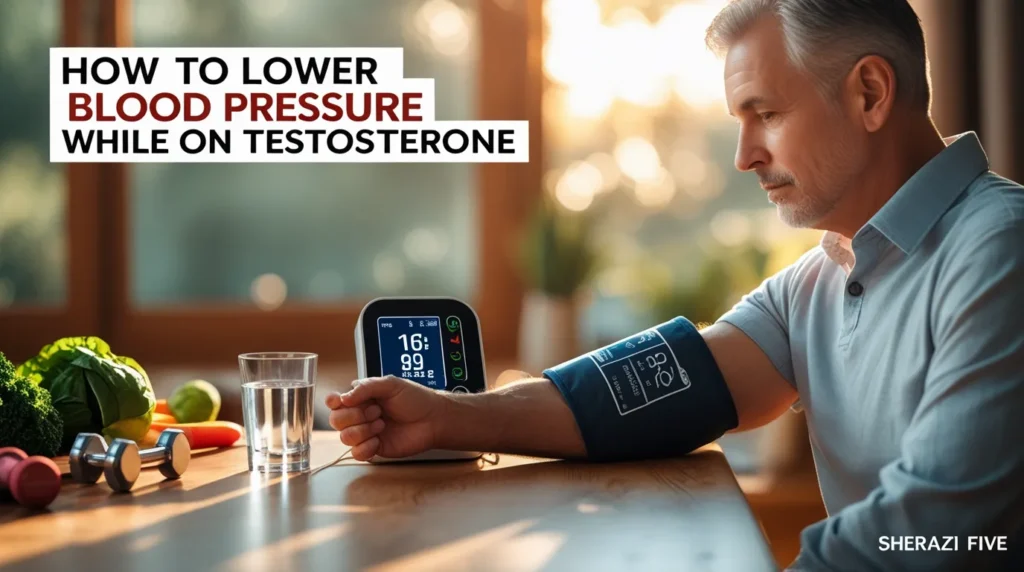Managing your health while on testosterone therapy can feel challenging, especially when it comes to controlling blood pressure. Many people on testosterone replacement therapy (TRT) notice slight changes in their readings, which can raise concerns about cardiovascular health.
The good news is that you can take smart steps to protect your heart and keep your numbers in a safe range. Understanding the link between hormones and hypertension risk helps you make better decisions. In this guide, you’ll learn how to lower blood pressure while on testosterone using practical lifestyle strategies, regular blood pressure monitoring, and safe medical support tailored to your needs.
Table of Contents
ToggleUnderstanding the Link Between Testosterone and Blood Pressure

Testosterone therapy for men can improve energy, mood, and strength. However, it also affects cardiovascular health. The hormone may change how your body retains fluid and produces red blood cells.
High red blood cell counts can make blood thicker. That can raise blood pressure over time, especially in those already at risk of hypertension.
Why Does Testosterone Increase Blood Pressure?
Testosterone replacement therapy (TRT) sometimes boosts the production of red blood cells. Thicker blood moves more slowly, creating extra pressure on the walls of arteries.
It can also cause mild fluid retention, which raises systolic and diastolic readings. Doctors monitor these changes to protect your heart health.
Can I Take Testosterone if I Have High Blood Pressure?

You can often use testosterone therapy if your hypertension is well-controlled. A doctor usually checks your hormone levels and blood pressure before starting TRT.
If your pressure is very high or you have other cardiovascular health issues, your doctor may suggest stabilizing it first. Regular monitoring is key.
Can You Take Testosterone with High Blood Pressure Medicine?
Most people on TRT can still take their usual blood pressure medicines. But some drugs may interact slightly with hormone levels.
Your healthcare provider may adjust your medication or ask for more frequent blood pressure monitoring. Always share your full medical history.
How to Lower Blood Pressure While on Testosterone ✅
You can keep blood pressure in check during testosterone therapy with healthy daily habits.
Here’s a quick look at proven strategies:
| Lifestyle Change | Benefit for Blood Pressure |
|---|---|
| Low-salt diet | Reduces fluid retention |
| Daily exercise | Strengthens the heart and arteries |
| Weight management | Lowers overall hypertension risk |
| Stress management techniques | Helps prevent spikes in readings |
| Limiting alcohol | Supports stable blood pressure |
Sometimes, doctors also prescribe medication to keep hypertension under control while continuing TRT.
What Is Normal Blood Pressure on TRT?

For most adults, a healthy reading is below 120/80 mmHg. When on testosterone replacement therapy, your doctor may set a slightly stricter or more personalized target.
Home blood pressure monitoring helps track daily changes. Consistent readings above 130/80 may need further attention.
Can Testosterone Cause High Blood Pressure in Women?
Women who use testosterone therapy for certain medical conditions can also experience mild rises in blood pressure.
Their hormone levels and cardiovascular health are monitored closely. Doses for women are usually lower, reducing most risks.
Keto Ruined My Health What You Need to Know
How Much Does Testosterone Raise Blood Pressure?
Studies show TRT may raise systolic blood pressure by 2–5 mmHg on average. The increase is usually mild but can be higher for those with obesity or hypertension risk.
Changes also depend on testosterone dosage, age, and lifestyle habits such as diet and exercise.
High Blood Pressure and Testosterone Injections

Testosterone injections often cause more fluctuations than gels or patches because levels rise quickly after each shot.
People using injectable TRT should have more frequent blood pressure monitoring. Doctors sometimes adjust the injection schedule or dosage to improve safety.
Long-Term Health Tips for Managing Blood Pressure on TRT
Regular checkups with your healthcare provider are essential. Early detection of any rise in blood pressure keeps your heart health protected.
Focus on a healthy diet, exercise, weight control, and avoiding smoking. Report any unusual symptoms like headaches, shortness of breath, or chest pain right away.
Frequently Asked Questions about Blood Pressure and Testosterone

1. Is testosterone replacement therapy safe for people with high blood pressure?
Yes, many people with hypertension can still use testosterone replacement therapy (TRT) if their blood pressure is well controlled. Doctors usually check your hormone levels and may adjust medications to keep your cardiovascular health protected.
2. How often should I check my blood pressure while on testosterone?
Most experts suggest checking blood pressure at home at least twice a week.
During the first few months of TRT, doctors often ask for more frequent blood pressure monitoring to catch any early changes.
3. Does testosterone always raise blood pressure?
No. While TRT can increase systolic blood pressure slightly, not everyone experiences this effect. Healthy lifestyle choices such as a low-salt diet, exercise, and weight control help keep readings in the safe range.
4. Are testosterone injections riskier for blood pressure than gels or patches?
Yes, testosterone injections may cause more fluctuations in hormone levels, sometimes raising blood pressure more than gels or patches.
People on injections usually need closer blood pressure monitoring and sometimes a different dose schedule.
5. Can women experience high blood pressure from testosterone therapy?
Yes, but the risk is usually lower than in men because women receive smaller doses.
Still, regular monitoring of hormone levels and blood pressure is important for women on testosterone therapy.
6. What lifestyle changes help lower blood pressure while on testosterone?
Simple steps make a big difference:
Eat a low-salt diet with more vegetables and lean proteins.
Get at least 30 minutes of exercise most days.
Maintain a healthy weight.
Limit alcohol and manage stress with relaxation techniques.
7. Should I stop testosterone if my blood pressure goes up?
Never stop TRT on your own. Contact your doctor if your blood pressure readings rise above the recommended range.
Often, adjusting the testosterone dosage, changing injection frequency, or adding a hypertension medication can solve the problem.




